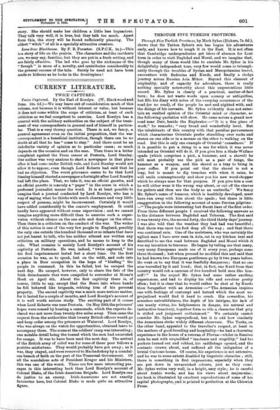C URRENT LITERATURE.
TWICE CAPTURED.
Twice Captured. By the Earl of Rosalyn. (W. Black wood and Sons. 10s. 6d.)—We may leave out of consideration much of this volume, not because it is without interest or value, but because it does not come within the scope of criticism, at least of such criticism as we feel competent to exercise. Lord Roselyn has a quarrel with the military authorities on the subject of the treat- ment of war correspondents in general and of himself in particu- lar. That is a very thorny question. There is not, we fancy, a general agreement even on the initial proposition, that the war correspondent is a beneficial institution, though there can be no doubt at all that he has "come to stay." And there must be an indefinite variety of opinion as to particular cases ; so much depends on the occasion and on the man. Then there is a bitter complaint against the Press censor at Pretoria, Lord Stanley. Our author was very anxious to start a newspaper in that place after it had come under British rule, and Lord Stanley would not allow it to appear, even though Lord Roberts had said that he had no objection. The worst grievance seems to be that Lord Stanley himself started a newspaper a fortnight after Lord Rossiya had left the place. That, we take it, was an official gazette, and an official gazette is scarcely a " paper " in the sense in which a professed journalist means the word. It is at least possible to imagine that a journal conducted by Lord Rosalyn, who has a way of saying what he thinks with much clearness and very little respect of persons, might be inconvenient. Certainly it would have added considerably to the censor's employment. It could hardly have appeared without some supervision ; and we cannot imagine anything more difficult than to exercise such a super- vision without offence on the one side and danger on the other. Then there is a criticism on the conduct of the war. The writer of this notice is one of the very few people in England, possibly the only one outside the hundred thousand or so infants that have not yet learnt to talk, who has neither uttered nor written any criticism on military operations, and ha means to keep to the rule. What remains is mainly Lord Roaslyn's account of his captivity at Pretoria. He was, indeed, "twice captured," but his first imprisonment lasted but a short time. On the first occasion he was, so to speak, lost on the veldt, and rode into a place in Boer occupation in the hope of " bluffing " the people in command. In this he failed, but he escaped the next day. He escaped, however, only to share the fate of the Irish detachments that were compelled to surrender at Mosses Hoek on April 4th. About the first captivity there is, of course, little to say, except that the Boers into whose hands he fell behaved like brigands, robbing him of his personal property. The second captivity was a much more serious matter, for it lasted for a couple of months, and Lord Rosalyn's account of it is well worth serious study. The exciting part of it comes when Lord Roberts was near Pretoria. On May 29th the prisoners' hopes were roused by hearing a cannonade, which the experts de- clared was not more than twenty-five miles away. Then came the request from the authorities that twenty British officers would go and keep order among the prisoners at Waterval. Lord Rosslyn, who was always on the watch for opportunities, obtained leave to accompany them. The scene at the soldiers' camp was interesting ; one notable detail being the tunnel which the men had excavated for escape. It was to have been used the next day. The arrival of the British army of relief was for some of these poor fellows a positive misfortune. They would probably have got away ; as it was, they stayed, and were removed to Machadodorp by a scandal- ous breach of faith on the part of the Transvaal Government. Of all the scandalous acts of President Kruger and his Ministers, this was one of the worst. There are few more interesting pas- sages in this interesting book than Lord Rosslyn's account of Colonel Blake, of the Irish-American Brigade. Lord Rosalyn can do justice to an enemy. Irish-Americans are not exactly favourites here, but Colonel Blake is made quite an attractive figure.






















































 Previous page
Previous page